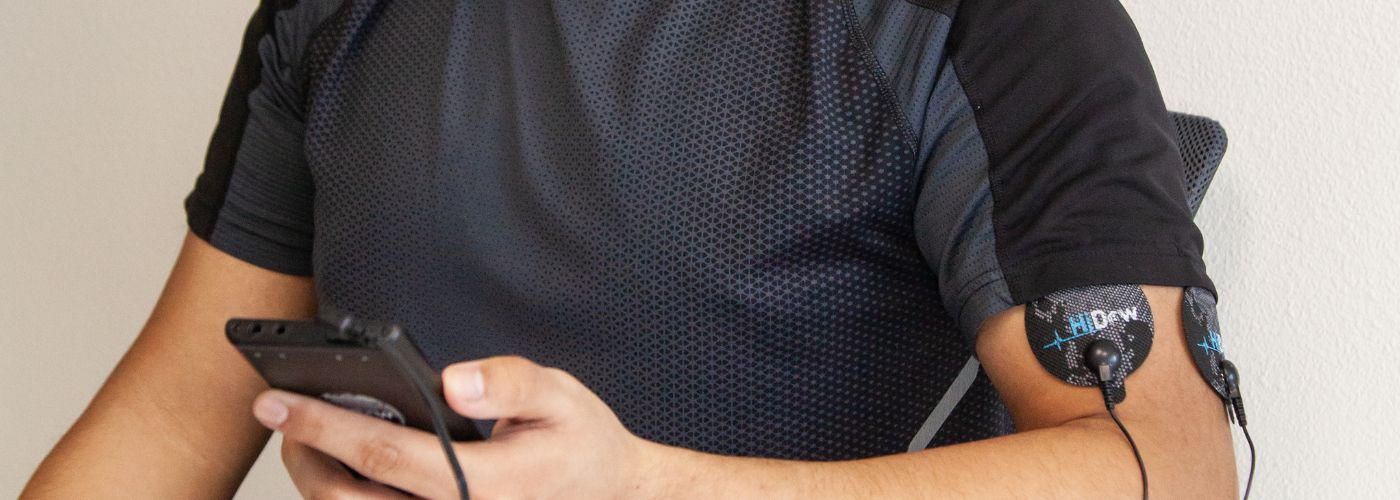In a world increasingly defined by convenience and connectivity, the tools we choose for pain management are no exception. We’ll be going over wired vs wireless TENS units to see which device is right for your needs and health. Each device has it’s own pros and cons that we’ll discuss thoroughly!
Main Differences in Wired vs Wireless TENS Units
When choosing between wired vs wireless TENS units, one of the most significant distinctions lies in user experience and mobility. Wired TENS units tend to offer a more stable connection due to their direct link via electrodes, which often results in consistent stimulation without interruptions.
However, this tethering can limit movement and add complexity to daily activities, making it less convenient for users who value freedom during their pain management routines.
On the other hand, wireless TENS units embrace modern technology by utilizing Bluetooth or other wireless connections, offering unparalleled portability and ease of use. Users can easily wear them underneath clothing while going about their day, whether it’s engaging in light exercise or simply relaxing at home.
Pros of Wired TENS Unit Devices
Wired TENS units offer several advantages that make them a preferred choice for many users seeking effective pain relief. One of the standout benefits is their reliability; without the need for frequent charging, they provide consistent therapy without interruptions.

This makes wired devices particularly valuable during long treatment sessions or when used in clinical settings, where the focus needs to be solely on patient care rather than device maintenance.
Additionally, wired TENS units often come equipped with advanced technology that allows for more precise control over stimulation patterns and intensity levels.
Users can experience a wider range of settings tailored specifically to individual pain management needs, often leading to improved outcomes. Furthermore, many wired models are designed to accommodate dual-channel stimulation, allowing simultaneous treatment of multiple areas—ideal for those dealing with complex or widespread discomfort.
Cons of TENS Unit Devices
While TENS unit devices have gained popularity for pain relief, they come with notable drawbacks that users should consider. One of the primary concerns is the reliance on connected wires on each electrode, which can create a cumbersome experience during use.
Users often find themselves entangled in these wires while trying to move about their daily lives. This limitation can reduce the practicality of using a TENS unit in public settings or even within one’s own home, where mobility and comfort are paramount.
Additionally, there is a learning curve associated with effectively using a TENS unit. Many users report feeling overwhelmed by the array of settings and configurations available, leading to frustration when attempting to find optimal pain relief.
Furthermore, inconsistent results among individuals can make it difficult to gauge whether the device will provide sufficient alleviation for specific types of discomfort. For some people, this inconsistency fosters skepticism about its overall efficacy and may deter them from committing.
Benefits of Wireless TENS Units
Wireless TENS units are revolutionizing pain management by offering unparalleled convenience and flexibility.
Imagine being able to alleviate discomfort while going about your daily activities, whether that means working at your desk, exercising, or simply relaxing at home. The portability of these devices eliminates the restrictions of traditional wired setups, allowing users to experience relief without feeling tethered.

Moreover, wireless TENS units often come equipped with user-friendly software that allows for personalized settings tailored to individual needs. Users can easily adjust intensity levels and modes straight from their smartphones, ensuring a customized experience that caters to their ever-changing condition throughout the day.
This technology empowers users by placing control in their hands, making pain relief more accessible than ever before.
Negatives of Wireless TENS Units
While wireless TENS units offer convenience and flexibility, several drawbacks can impact their effectiveness and user experience. One significant concern is the reliance on batteries or charging systems.
When the battery runs low, users may find themselves without pain relief when they need it most, leading to frustration and potential setbacks in managing chronic pain. Additionally, if a device fails to charge properly or malfunctions due to software issues, individuals might feel stranded with no immediate alternative.
Another downside is the degree of signal interference that can occur with wireless devices. Walls, furniture, or even body movements may obstruct signals between electrodes and the control device, potentially disrupting treatment sessions.
This uncertainty may deter users who desire consistent results in their pain management routine. Moreover, some people may find it challenging to navigate Bluetooth connections or app interfaces while managing discomfort.
Deciding Whether Wired vs Wireless is Right For You
When considering whether to choose a wired or wireless TENS device, it’s essential to evaluate your lifestyle and specific needs. Wired devices often provide a direct connection that can deliver consistent stimulation, making them ideal for users who prioritize reliability during longer sessions.
However, they can be cumbersome for those seeking mobility; the tangled wires may feel restrictive and limit freedom of movement during everyday activities.
On the other hand, wireless TENS devices offer unparalleled convenience and flexibility, allowing you to remain active while managing pain effectively. With advancements in technology, many wireless options now feature user-friendly software that enable you to customize settings right!
Overall, both wired and wireless TENS units are great if you’re using it for shoulder pain or any other type of pain.

Related Stories
How to Cope with a Sports Injury
Staying active helps your body stay strong. But sometimes, activity leads to pain, strain, or...
Jul
Red, White, and Soothe: How HiDow Helps You Recover in the Heat
Recovery that works in winter doesn’t always hold up in the heat. The body reacts...
Jul
Massage Gun Showdown: How the Power Duo Compares to Traditional Methods
Have you ever considered that a handheld device could revolutionize your muscle recovery? With the...
Jun
Fatherly Fitness Tips For Men’s Health Month
Men’s Health Month is more than a date on the calendar—it’s a call to action....
Jun
Built to Move: The Everyday Recovery Edit
Movement is what keeps us going—literally. Whether it’s recovering after a run, loosening up after...
Jun
Unlocking The Secret To Tissue Injury Recovery With TENS/EMS Devices
Have you ever wondered why some injuries take longer to heal than others? Tissue injuries...
May